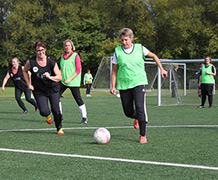
The study found that football is an effective therapy for poor fitness and high blood pressure in 35‒50-year-old women. Image: Bo Kousgaard
Recreational football reduces high blood pressure in mature women
The World Cup in Brazil may be attracting a global armchair audience of millions, but new research has shown that playing football could help lower blood pressure in women aged 35-50.
Women within this age group with mild high blood pressure achieve a significant reduction in blood pressure and body fat percentage through playing recreational football for 15 weeks.
This is the finding of a new study conducted in a collaboration between researchers across four countries, including Professor Peter Krustrup of the University of Exeter.
The acclaimed Scandinavian Journal of Medicine & Science in Sports is today publishing two articles on recreational football for older women. The first article shows that 35‒50-year-old untrained women with mild high blood pressure achieve a significant improvement in physical fitness and a considerable reduction in blood pressure and body fat percentage after 3 x 1-hour football training sessions per week over 15 weeks. The second article describes the enthusiasm of women for the recreational football concept Football Fitness, which is currently being rolled out in football clubs across Denmark.
“After 15 weeks of participation in recreational football, systolic and diastolic blood pressure had fallen by 12 and 6 millimetres of mercury (mmHg) and the women had lost 2.3 kg of fat on average,” says project leader Magni Mohr. “The football training produced an impressive reduction in blood pressure that was more than twice as big as with swimming performed over the same period as the football.”
The researchers also found that women like playing football even if they have no previous experience of the game. Magni Mohr added: “The players faithfully attended training, with an attendance rate of over 90%. In fact, through the project period they came to enjoy playing so much that they have now started up their own football club.”
“Our previous studies have shown that 16 weeks of football training reduces blood pressure in 20‒45-year-old women with normal blood pressure, but this is the first study that has looked at the effects of recreational football in women with high blood pressure,” says Professor Peter Krustrup of Sport and Health Sciences, who has been studying the health effects of recreational football and many other forms of physical activity for the past 10 years.
“As well as the impressive effects on blood pressure and body composition, we also saw a drop in cholesterol and a big improvement in physical fitness as a result of the 15 weeks of football training,” says Krustrup. “In fact, the women were able to run more than twice as far in a Yo-Yo Intermittent Endurance Test and their heart rate was 14 beats per minute lower when working at moderate intensity. Recreational football is an effective therapy for poor fitness and high blood pressure in 35‒50-year-old women.”
“Traditionally, there haven’t been so many older female players in English, Faroese or Danish football clubs, but the relatively new Danish initiative of Football Fitness has really caught on with women,” says sports sociologist Laila Ottesen, currently engaged in an extensive study of the Football Fitness concept, which was started in 2011 by the Danish Football Association and the Danish Sports Confederation.
“At present, there are 180 football clubs across Denmark offering Football Fitness. In just a few years, the initiative has become hugely popular with women, who currently make up almost 75% of players. Football Fitness is about training in a fun, sociable and healthy way and not about playing matches against local rivals,” says Ottesen.
“Matches are not part of the package, and consequently Football Fitness appeals to a lot of women who have never been in a football club before, in Denmark and and probably also many other countries” concludes Ottesen.
In the training project, 41 untrained women aged 35‒50 years with mild high blood pressure of around 140/90 mmHg were randomly assigned to either a football training group or an inactive control group. The football group trained for 1 hour three times a week for 15 weeks. The training was performed on artificial grass in Torshavn in the Faroes. An extensive testing protocol was used before the start of training and on completion of the 15-week period.
The project was conducted as a collaboration between the University of Exeter (UK), the University of Gothenburg (Sweden), University of the Faroe Islands, Faroese National Hospital, The Faroese Football Association, Rigshospitalet and the Copenhagen Centre for Team sport and Health at the University of Copenhagen (Denmark).
The Football Fitness project comprises research into Danish football clubs and was carried out by, among others, associate professor Laila Ottesen and PhD student Søren Bennike of the Copenhagen Centre for Team Sport and Health.
The two studies are today being published in a special issue of the Scandinavian Journal of Medicine & Science in Sports on the topic of football for health.
You can read more about the special issue’s 16 scientific articles on the website of the Copenhagen Centre for Team Sport and Health (www.holdspil.ku.dk).
Date: 19 June 2014
